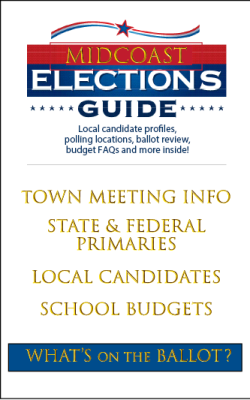UPDATE Maine Ethics Commission votes to investigate anonymous St. George political postcard
AUGUSTA — Following a brief discussion July 24, the Maine Commission of Government Ethics and Elections Practices – more familiarly known as the Maine Ethics Commission — voted unanimously to investigate whether an advocacy postcard mailed May 10, three days prior to a May 13 St. George municipal referendum vote, violated state law.
The Commission agreed with Commission Executive Director Jonathan Wayne that there were missing pieces, such as identifiable individuals associated with the mailer, but also agreed it would be inappropriate not to pursue some sort of investigation.
“I think we have enough to say that given the number of voters in the town that $500 was spent,” said Commissioner Sarah E. LeClaire, of Woodland. “I am disinclined to just say, ‘oh well, we cannot do anything, let’s move on,’ because it will give a road map to anybody else to do this.”
Maine Rep. Ann Matlack had originally filed the complaint in May with the Commission, and at the July 24 hearing, she said via phone in a conversation with the Commissioners that the mailer had, “outraged many people in my community because of all these distortions.”
Additionally, she cited the principles of campaign finance transparency and said, “I want to make sure this doesn’t happen again.”
In May, the Ethics Commission had fined a group in Boothbay on similar grounds. The findings were:
“In response to a complaint, at its April 18, 2024 meeting the Commission authorized department staff to investigate groups that were financially active in supporting and opposing an April 24, 2024 school construction referendum in the Boothbay region. Staff will report back to the Commission on its findings that Citizens for a Bright Future for the Boothbay Region should have registered and filed a report as a BQC.”
ST. GEORGE – The topic of a postcard sent anonymously via U.S. Postal Service just prior to a May 13 town vote in St. George is on the agenda of Maine’s Commission of Government Ethics and Elections Practices when it convenes July 24 in Augusta.
A complaint was filed May 31 by St. George resident and state Representative Ann Matlack, who requested the Maine Ethics Commission to investigate, “to ensure this does not happen again in St. George or any other small community.”
The postcard advocated for a “no” vote on an article asking St. George voters if they wanted to transfer a portion of the town-owned 78-acre parcel known as Kinney Woods to to the St. George Community Development Corporation to build up to seven homes there in an attempt to address a housing shortage. The measure failed at the polls, with 327 opposing and 304 in favor.
But the postcard did not state on it the name of the sender, which is against the law.
In 2023, the Maine Legislature amended the state’s Counties and Municipalities Law in a section governing campaign finance reporting concerning referenda in towns and cities with a population of 15,000 or less.
A new disclosure requirement in Title 21, Section 1055 stipulated that when a person make expenditures exceeding $500 for paid communications expressly advocating for or against a ballot question, the communication must state the name and address of the person who made or financed the expenditure for the communication.
The disclosure statement is sometimes referred to as a disclaimer because of the typically small format of the message, according to a July 16 memo to the Ethics Commission outlining the case.
Matlack had received the postcard in the mail on May 10. She asked the Commission to investigate whether the card should have stated who paid for the mailing and whether the persons responsible for the mailing should have filed information with the Commission.
Matlack knows the law because she had been the sponsor of the amendment just one year prior.
“Last year, the Maine League of Women Voters asked me to sponsor a bill to address a gap in Maine’s campaign finance laws,” she said, July 23. “Specifically, to bring the same campaign finance transparency that exists for state ballot questions to smaller local jurisdictions. This bill became law a year ago.”
The circulation of postcards in local elections prior to votes is not uncommon. Several were sent in June just prior to Rockport’s referendum on the future of its wastewater treatment plans. One did not state the sender’s name.
In the case of St. George, Matlack said: “The postcards contained inaccurate information and were mailed out just a few days before the Town Meeting referendum ballot was to be voted on. There was no opportunity to correct the misinformation or to determine who sent out the postcards or why.”
Whether or not the Commission will initiate an investigation will be decided July 24.
“When the Commission has received a request for investigation from a source outside the department, campaign finance law states the Commission ‘shall make the investigation if the reasons stated for the request show sufficient grounds for believing that a violation may have occurred,’” the memo said.
In the Commission’s Staff Analysis, it was noted that, “disclaimers in political communications can help members of the public give proper weight to the campaign messages they are receiving on their screens and in their mailboxes.”
Anonymous communications with road signs and a newspaper-style mailing have presented before the Commission, which resulted in, “enforcement action when sufficient evidence was available to demonstrate that a disclosure law was broken,” the analysis said.
At the July 24 meeting, the Commission will evaluate whether Matlack’s complaint meets the legal standard of showing sufficient grounds for believing that a violation may have occurred.
“In the staff’s opinion, the complaint probably reaches the ‘may have occurred’ standard but that is a subjective judgement,” the memo said. “The facts are not as clear here as in other cases.”
Unknowns include how many cards were actually mailed, what the postage amounted to, and no indication of who paid for the production and mailing of the cards.
But the Commission is behind Matlack’s effort to push for transparency.
“Disclosure statements in paid political communications play an important informational function,” the memo said. “The Commission believes in energetic enforcement to reinforce this legal requirement. In our view, however, this case poses some considerations that were not present in our previous investigations of anonymous paid communications.”
Matlack emphasizes full disclosure.
“Transparency in campaign finance serves an important public interest,” she said. “Voters have a right to know who is speaking to them in a campaign. Is it neighbors coming together to express support or opposition? Is it an individual or a corporation with a vested interest in the outcome of the vote? Required disclosures reveal who is behind campaign spending, how much is being raised, and how the money is spent. It helps communities understand who stands to gain or lose in deciding a ballot question.”
She maintains the new law has a low threshold for when an individual, group or organization must file with the Maine Ethics Commission regarding a ballot question: $500.
She said that forever stamps were used to mail the postcards from South Portland.
“There are 2,069 registered voters in St George,” she said. “If a postcard were sent to every St George voter, that would be $510, just above the threshold for reporting this expenditure. I’ll grant that whoever sent out the postcards may not have known about the new reporting law. But the timing of the mailing was such that there could be no opportunity to correct the misinformation being sent out.”
Moreover, Matlack wants the public to be aware that sending anonymous mailers before elections is inappropriate, and potentially illegal.
“I filed a complaint with the Maine Ethics Commission regarding the postcards because I wanted to let people know there was now a statute that prohibited such anonymous lobbying,” she said. “And I was also incensed that misinformation, hyperbole and inflammatory language was used to sway an election without an opportunity to clarify and correct the inaccuracies contained on the postcards.
“While the postcard drop in St George obviously was a shoestring operation, what if an outside interest decided to spend thousands of dollars to get their way? I’m sure many in St George and in towns such as Thomaston, Rockport and Boothbay, where anonymous lobbying has occurred recently, would want to know who was behind the flashy signs, flyers or mailers they were seeing.”
She said: “Whether it’s about the best way to provide broadband internet access, setting building and development standards, the role of cruise ships in the local economy, or whether to donate land for community housing — private citizens need all the information they can get. Everyone in our communities benefit from timely and accessible campaign finance information.”
Reach Editorial Director Lynda Clancy at lyndaclancy@penbaypilot.com; 207-706-6657
































